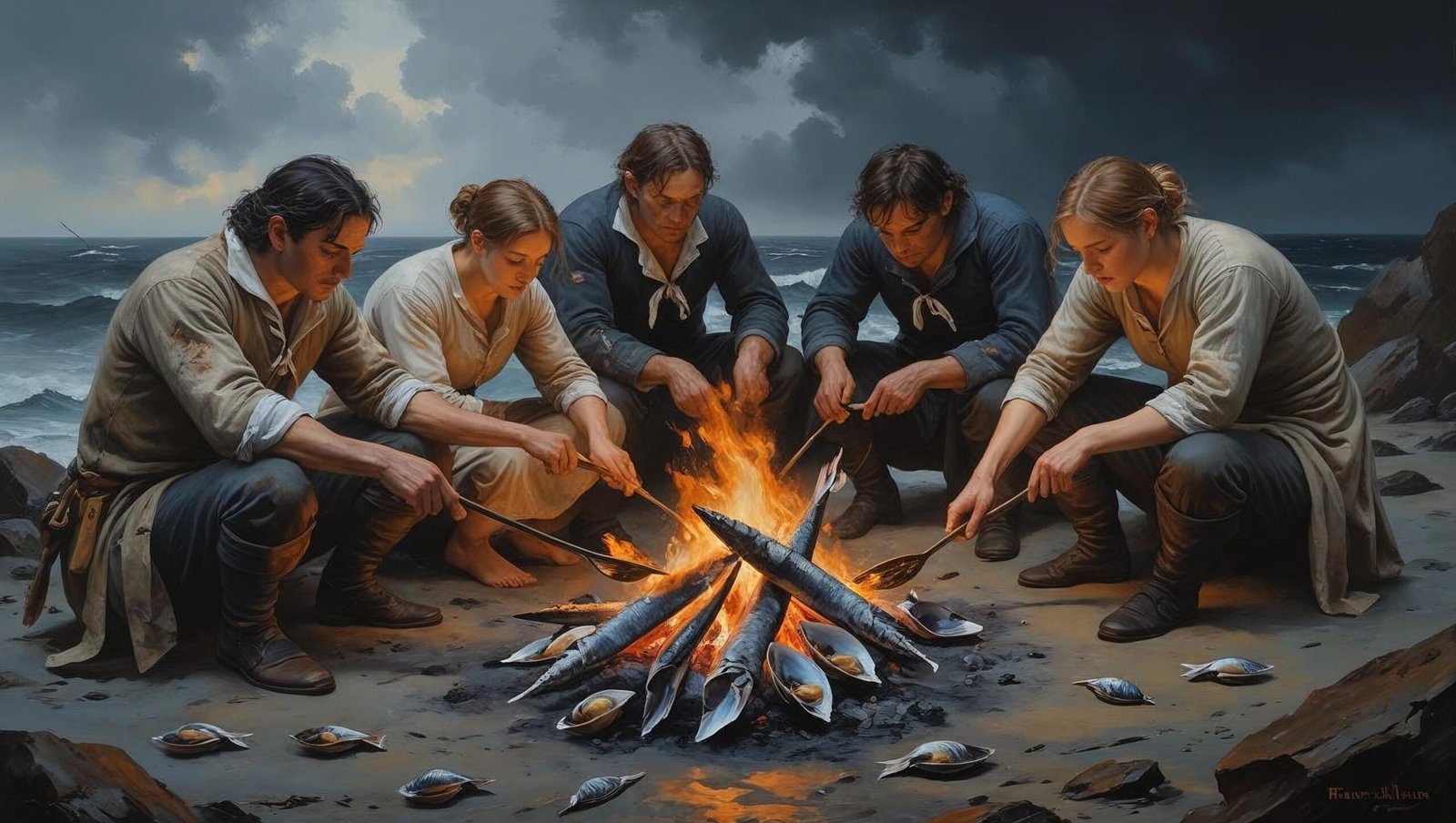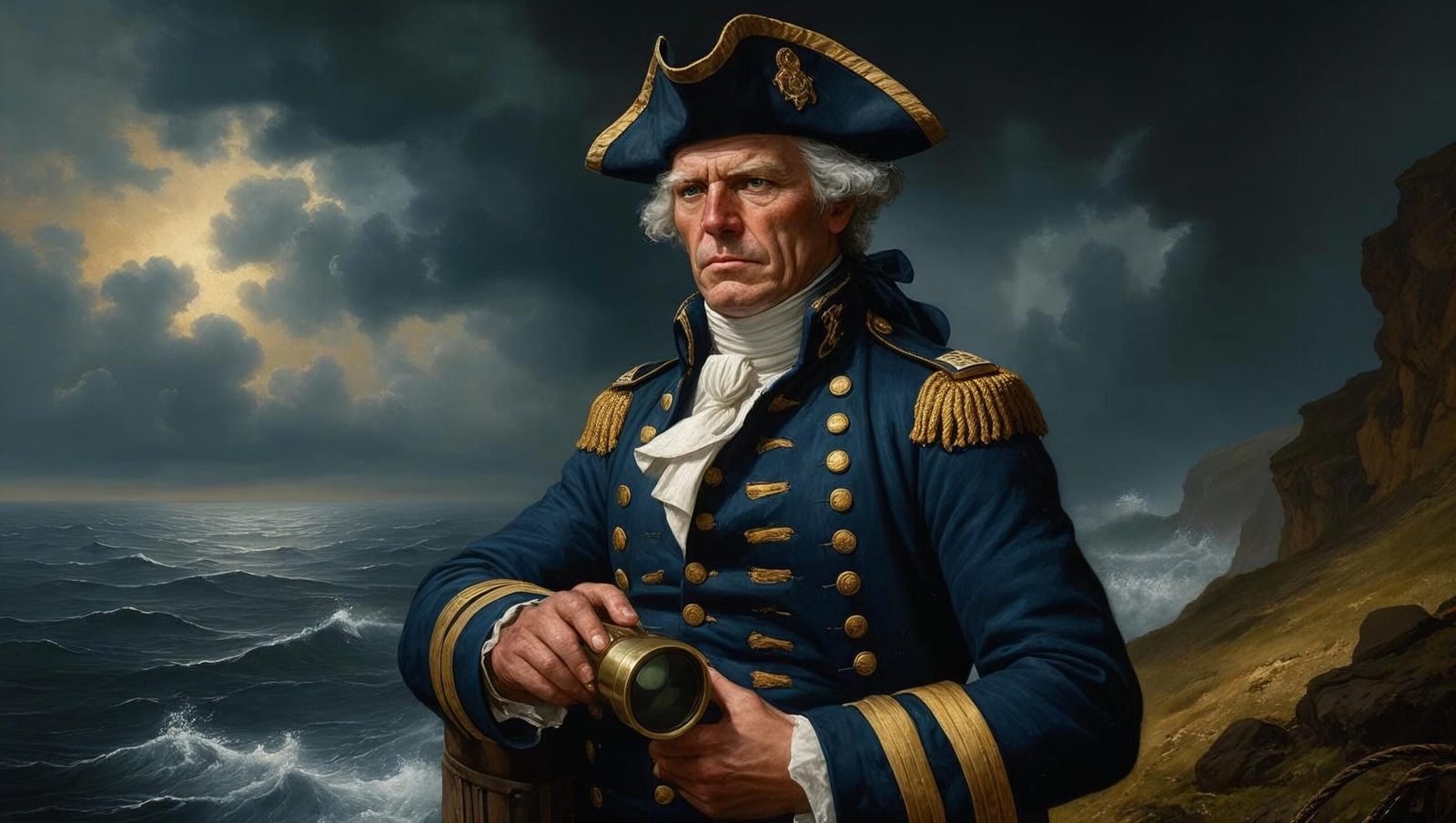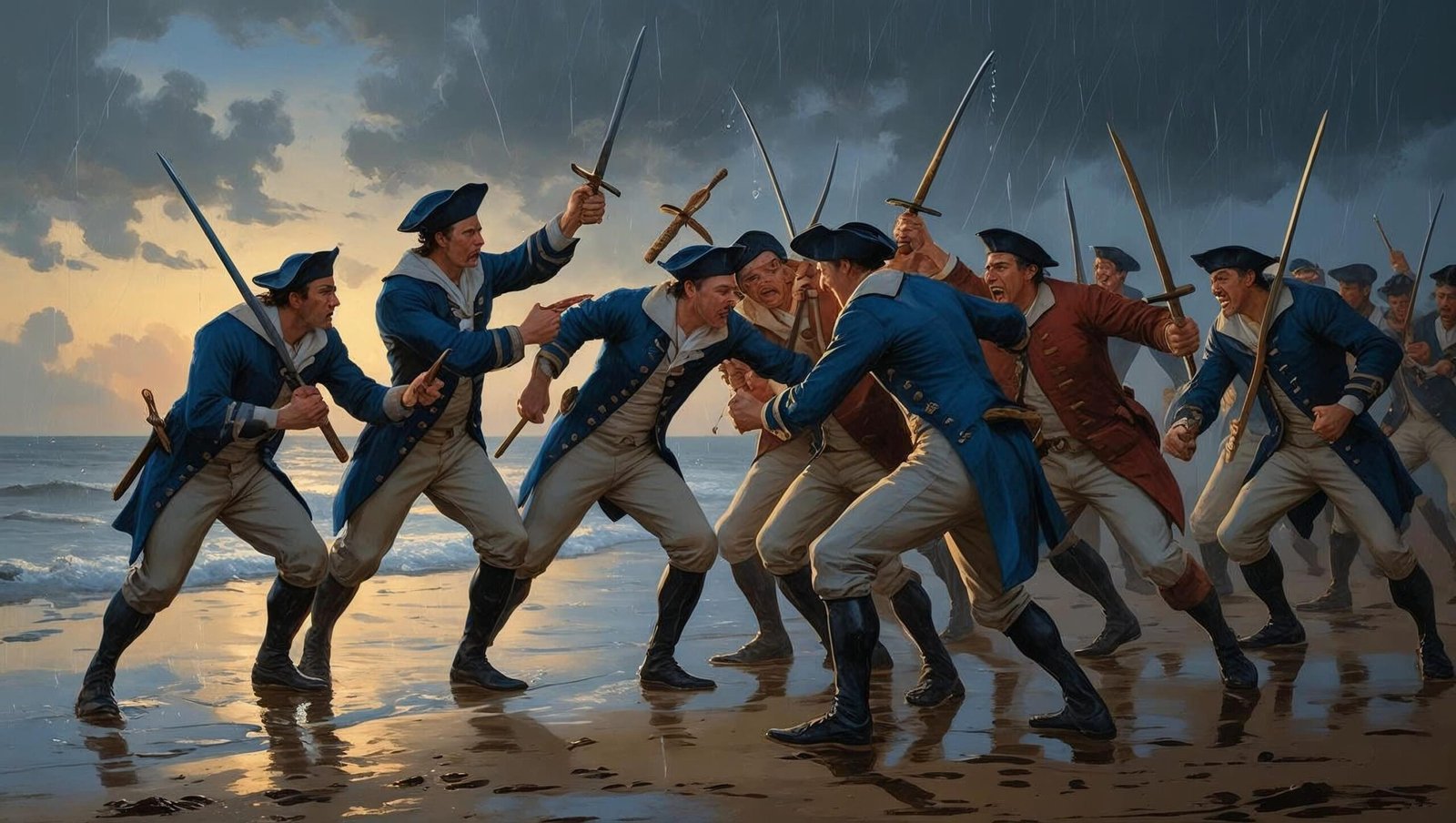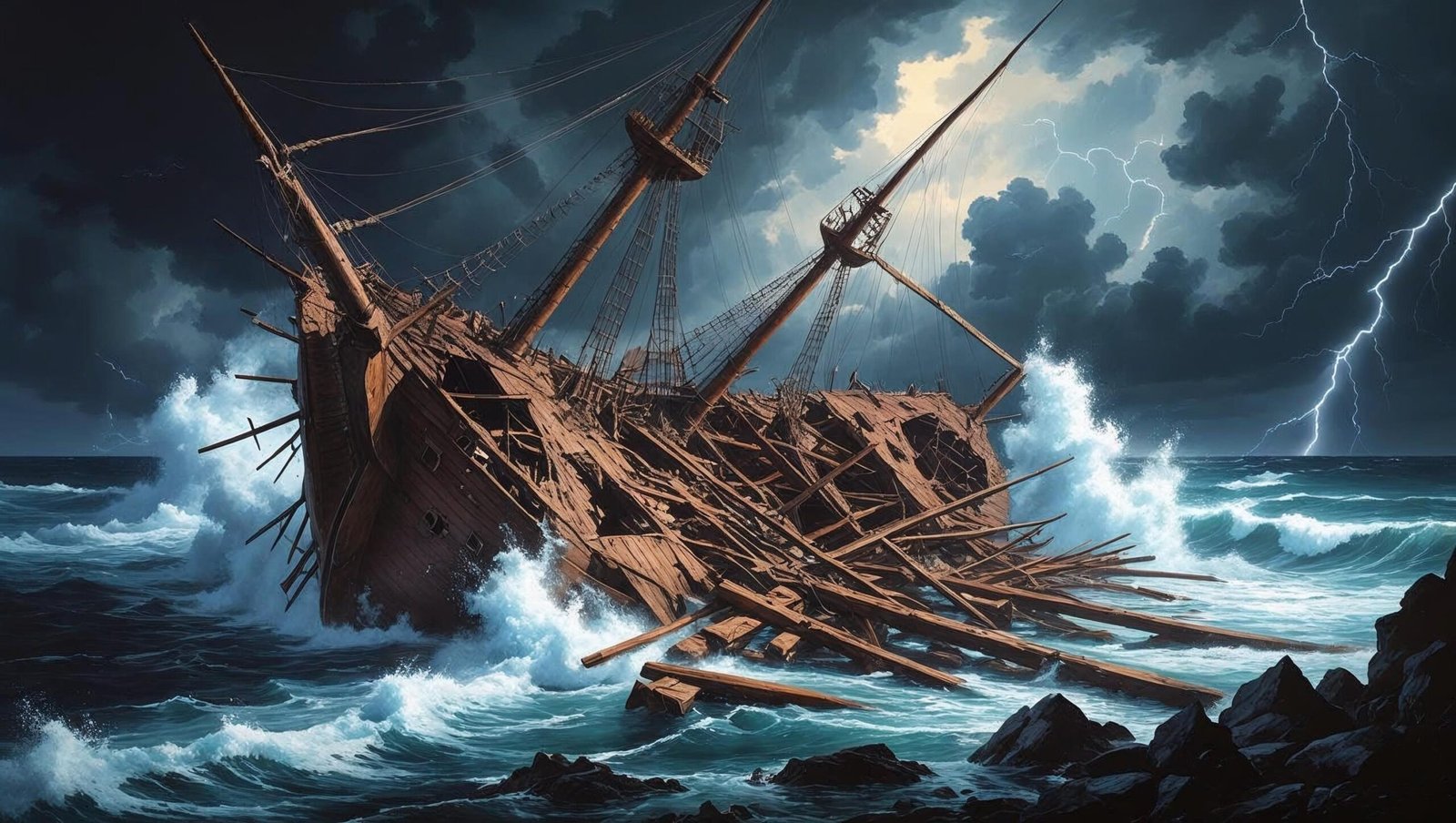The Wager by David Grann: 9 Harrowing Truths That Will Haunt You
The Wager by David Grann is more than a maritime saga—it’s a masterful exploration of survival, mutiny, and the fragile boundaries between civilization and savagery. With surgical precision and narrative brilliance, David Grann resurrects the doomed voyage of HMS Wager, a British warship that crashed into the edge of the world—and into the abyss of human nature.
In this gripping chronicle, The Wager by David Grann tells the true story of men cast ashore on an uninhabitable island off the coast of Patagonia in the 1740s, as starvation, power struggles, and betrayal unravel their moral compass. This is not simply a tale of the sea—it’s a mirror held up to mankind’s darkest instincts.
Below, we dissect nine haunting truths revealed in The Wager by David Grann—truths that redefine what it means to lead, to survive, and to remember.

1. In The Wager by David Grann, Glory Turns into Grief
The Wager by David Grann opens with the grand vision of imperial conquest. The British Admiralty dispatches the HMS Wager as part of an elite squadron meant to ambush a Spanish treasure galleon during the War of Jenkins’ Ear.
But Grann quickly reveals how flawed this vision is. The mission is shrouded in inadequate preparation, terrible logistics, and fatal overconfidence. What begins as a voyage of honour transforms into an unrelenting nightmare.
The glory of empire is exposed as a hollow promise—and the men are left to pay the price.
2. The Shipwreck That Shattered Naval Order
The heart of The Wager by David Grann is the catastrophic shipwreck. HMS Wager, battered by ferocious storms off Cape Horn, is torn to pieces and cast upon the shores of a desolate island.
Grann’s portrayal of the wreck is visceral. Every wave crashes not just into the hull, but into the very ideals that structure naval command. Survival becomes paramount, and with the ship destroyed, so too is the chain of command.
The wreck is both literal and metaphorical—an implosion of imperial order.
3. Mutiny as a Moral Collapse
In The Wager by David Grann, mutiny emerges not as treason, but as desperation.
Captain David Cheap clings to authority despite being injured, irrational, and increasingly isolated. His nemesis, gunner John Bulkeley, defies him to lead a breakaway group back to civilization.
Grann does not offer simple heroes or villains. Instead, he lays bare the chaos that erupts when structure vanishes. The mutiny, more than a rebellion, is an existential revolt—a terrifying glimpse into what humans become when law fails.
4. Nature’s Cold Indifference
One of the most chilling elements of The Wager by David Grann is nature itself. Grann crafts the island not as a passive setting, but an antagonistic force.
Endless cold, driving rains, and merciless hunger reduce proud men into ragged survivors. The environment becomes a crucible, burning away every layer of civilization.
In this context, Grann suggests nature is not a place to be conquered, but a force that exposes human fragility in its most brutal form.
5. Dual Testimonies, Fractured Truths
When survivors finally return to England, The Wager by David Grann takes a riveting turn: the battle for truth begins.
Two groups arrive months apart—one led by Bulkeley, the other by Cheap—each telling opposing stories. One accuses the other of cowardice, treachery, even murder.
At the heart of The Wager by David Grann lies this question: whose version of survival is true? Grann shows how history often bows not to facts, but to storytelling prowess.

6. The Court-Martial That Tested the Empire’s Soul
The Wager by David Grann climaxes in a courtroom drama where mutiny, survival, and honour are interrogated. The British Admiralty seeks to preserve its image, but the returned sailors have already shaken the public’s faith in imperial infallibility.
Grann’s reconstruction of the trial is taut and politically charged. It’s here we see how power manipulates truth—and how survival may sometimes require not just enduring hardship, but rewriting one’s own story.
7. David Grann’s Masterclass in Narrative Nonfiction
Every page of The Wager by David Grann showcases his journalistic finesse. With access to logbooks, trial records, and personal journals, Grann resurrects lost voices, forgotten lands, and the raw terror of being lost in an uncaring world.
He does not lecture. He evokes. He does not simplify. He confronts.
The Wager by David Grann is as much about telling a story as it is about showing the unreliability of every story.
8. Empire on Trial
More than a story of sailors, The Wager by David Grann is an indictment of empire. The mission itself was ill-planned, its leadership negligent, and its victims ultimately scapegoated.
Grann doesn’t spare the British Admiralty. He shows how easily bureaucracies deflect blame onto broken men, discarding them once their usefulness ends.
In this sense, The Wager by David Grann is a piercing examination of how nations sanitize history while burying its inconvenient truths.
9. Human Nature in Extremis
Perhaps the greatest strength of The Wager by David Grann is its haunting study of human nature under duress.
Grann forces readers to confront uncomfortable questions: Would you remain loyal to a failing leader? Would you commit mutiny to save your life? Would you abandon others to survive?
These are not abstract concepts—they’re lived realities in this tale. The Wager by David Grann strips away the veneer of morality and asks: Who are you when no one is watching?
Shipwreck as a Literary Device Across History
Throughout literary history, shipwrecks have served as powerful metaphors for existential collapse. From Homer’s Odyssey to Shakespeare’s The Tempest, the image of a broken vessel lost at sea reflects humanity’s confrontation with fate, nature, and the limits of control. In that tradition, this account of men stranded and disoriented on the margins of the known world resonates as both literal and symbolic.
The ship does not simply sink—it disintegrates the structures that once held order intact. Naval hierarchy, patriotism, and unity vanish alongside the timbers of the vessel. This unraveling sets the stage for a gripping exploration of identity and desperation.
Such symbolism elevates the narrative from historical event to moral parable. The storm becomes a reckoning not just of wood and wind, but of conscience. It asks the reader: when structures fail, who do we become?

Leadership Under Siege: The Case of David Cheap
Captain Cheap’s descent into physical and mental collapse invites broader reflection on leadership under pressure. Injured, isolated, and clinging to naval codes that no longer apply, he becomes a tragic figure—an emblem of rigidity amidst chaos.
Leadership, in this context, becomes a double-edged sword. On one side is duty, the relentless obligation to command and protect. On the other is humanity, the need to adapt, empathize, and sometimes yield. Cheap’s failure lies not merely in poor decisions but in an inability to reconcile these conflicting roles.
The captain’s insistence on military discipline long after the ship has perished renders him an anachronism—a ghost of order in a world governed by survival. Yet his downfall also reveals the emotional weight borne by those in command, especially when command becomes a burden no longer backed by power.
Bulkeley’s Logbook and the Ethics of Truth
The gunner, John Bulkeley, left behind a detailed log that offers a contrasting lens into the catastrophe. His writings became the primary version of events for years, shaping public perception and judicial outcomes.
This invites scrutiny on the ethics of memoir, the reliability of memory, and the politics of documentation. Bulkeley’s narrative is rational, methodical, and self-justifying. It casts his decisions as pragmatic and necessary, distancing the author from accusations of betrayal or insubordination.
In examining the gunner’s prose, readers confront a larger dilemma: Can any account of trauma be fully objective? Do we write to remember, or to persuade? The logbook, while historically invaluable, is also an artifact of image management—a crafted truth rather than an unfiltered memory.
Imperialism’s Invisible Hand
Beneath the surface of this survival story lies the unseen machinery of colonial ambition. The mission was conceived not as exploration, but as conquest. It was part of a global struggle for resources, territory, and dominance.
The men aboard the vessel were pawns in a larger geopolitical game, driven by the British Empire’s hunger for Spanish silver. Their suffering was incidental to the crown’s designs—a sacrifice expected in the name of national pride.
This imperial backdrop casts a shadow over the events. It reveals how empires deploy grand language—honour, glory, destiny—to mask the transactional cruelty of expansion. The individuals who endured loss and trauma were discarded when their stories threatened the narrative of British virtue.
Moral Dissonance in Isolation
Isolation does not only strip the body—it peels away ethical certainties. On the island, far from the gaze of society, men were forced to create their own moral systems. The dilemma of whether to share food, abandon the sick, or defy leadership was no longer theoretical—it was life or death.
These ethical decisions are rendered without melodrama, which makes them all the more haunting. The narrative presents no divine judgement, no cosmic justice. Only choice, consequence, and regret.
Such ambiguity challenges conventional interpretations of heroism and villainy. It suggests that survival often demands decisions incompatible with moral purity. This tension between necessity and ethics is perhaps the most human aspect of the ordeal.
Narrative as Redemption or Condemnation
When the survivors returned home, they found themselves not embraced but interrogated. Their future depended not on what they had endured, but on how persuasively they could explain it.
Some wrote journals. Others testified before tribunals. Each attempted to shape the outcome not through further struggle, but through narrative control. Their reputations, and in some cases their lives, hinged on how compellingly they told their stories.
This reveals the paradox of truth in the historical record. It is not always the most honest who prevail, but the most articulate. It underscores the way history often reflects narrative strength more than factual accuracy.

Legacy and the Fragility of Memory
What is remembered, and what is forgotten? That question permeates every page of this account. The events, once infamous, nearly vanished from collective memory until rediscovered centuries later.
This impermanence raises difficult questions. Why do some catastrophes become national legends while others dissolve into obscurity? Is it timing, politics, or simply the absence of chroniclers?
By reconstructing this episode with diligence and empathy, the author performs an act of rescue—not of the survivors, but of the past itself. He ensures that the pain, courage, and confusion of these men are not lost to time.
Philosophical Reflections on Justice
The proceedings that followed the return of the sailors are as illuminating as the wreck itself. The court’s task was to determine guilt—yet its definitions of loyalty and betrayal were grounded in a context that no longer applied on the island.
Justice, here, becomes elastic. It stretches to accommodate the state’s need for consistency while minimizing damage to its image. Those who broke rules in order to live were tried by those who had never faced such decisions.
This disconnect exposes the limits of institutional justice. It shows how systems of judgment are often inadequate in the face of moral complexity. What is treason in one context may be resilience in another.
Survival as a Solitary Act
Amidst the themes of leadership, rebellion, and empire, one truth remains: survival is deeply individual. While many died together, those who lived did so alone in spirit. Each man’s experience, though part of a larger tragedy, was uniquely his own.
This underscores the loneliness that follows extreme suffering. Even among comrades, there is a solitude born of having seen and done the unspeakable. Return to society does not erase that distance. If anything, it reinforces it.
The aftermath is filled with silence—words unsaid, memories repressed, lives forever shaped by a few desperate months.
Why This Story Resonates Today
Though centuries have passed, the story remains startlingly relevant. It echoes in modern tales of whistleblowers, abandoned soldiers, and those punished for surviving on their own terms. It reflects the eternal tension between personal conscience and institutional loyalty.
Moreover, it serves as a cautionary tale about unchecked ambition, the brittleness of authority, and the ease with which the powerful disown their agents when things go awry.
In an age where truth is contested and loyalty commodified, this tale offers sobering lessons. It reminds us that courage does not always align with obedience, and that survival sometimes requires the betrayal of norms.

The Haunting Power of Silence
One of the most affecting aspects of this narrative is what is not said. Gaps in journals. Omitted details. Discrepancies between testimonies. These silences are not mere oversights—they are shields, wounds, and sometimes weapons.
They suggest that some truths are too painful to name. Or perhaps too dangerous. Silence becomes its own language—one that speaks volumes about trauma, guilt, and fear.
For the reader, these absences demand interpretation. They force engagement beyond the text, prompting us to ask not just what happened, but what was left out—and why.
FAQs on The Wager by David Grann
Q1. What genre is The Wager by David Grann?
It’s narrative nonfiction—a true story presented with the tension, character development, and drama of a novel.
Q2. Is The Wager by David Grann historically accurate?
Yes. Grann meticulously uses primary sources such as journals, logs, and court records to recreate the events.
Q3. Is the mutiny in The Wager by David Grann justified?
Grann presents both sides—leaving it up to the reader to decide whether the mutiny was cowardice, self-preservation, or both.
Q4. What makes The Wager by David Grann different from other survival stories?
Its blend of historical depth, moral complexity, and Grann’s narrative genius make it more than a survival tale—it’s a psychological study and political commentary.
Q5. Who should read The Wager by David Grann?
Fans of maritime history, psychological drama, and high-stakes nonfiction will find this an unmissable read.
Conclusion: The Wager by David Grann Is a Testament to Truth, Terror, and the Will to Live
The Wager by David Grann is not merely a shipwreck story. It’s a profound investigation into power, morality, leadership, and survival. Grann’s haunting prose leaves readers adrift in questions with no easy answers.
This book resonates because it is not set solely in the 18th century—it echoes today. In fractured truths, weaponized narratives, and institutional cowardice, The Wager by David Grann reflects modern society’s dilemmas.
Whether you read it as history, thriller, or morality play, one truth remains—this story will stay with you. It’s not just about what happened, but about what we choose to believe happened.
Visit: shubhanshuinsights.com for more insightful book reviews that challenge your mind and stir your conscience.
🔥 Powerful Comments for Engagement
-
“This is the best breakdown of The Wager by David Grann I’ve seen anywhere online. Brilliant!”
-
“You’ve captured the emotional and ethical tension so well. This review made me rethink the story.”
-
“A haunting and powerful analysis. I need to read the book now!”
-
“The Wager by David Grann has layers I didn’t realize until I read this. Exceptional post!”
-
“Staggering insight. Please do more reviews of historical nonfiction like this!”